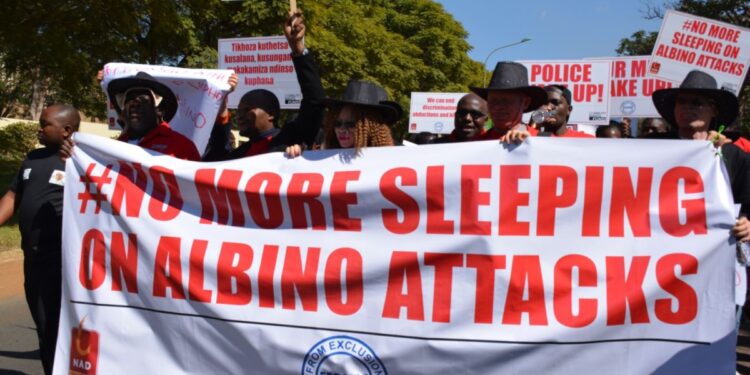By Ebi Kesiena
Civil society group representing people with albinism in Malawi has appealed for urgent intervention to stop continued attacks on people with albinism in the country.
This comes on the heels of unidentified people in June tampered with a grave in Blantyre, a city in southern Malawi, exhumed a body and removed its arms and legs.
According to advocates, the incident has raised existing fears within the community.
President of the Association of Persons with Albinism, Young Mahamba explained that the incident is the seventh this year alone.
“We also had three tampering with graves and another two attacks on the 9th of last month (June 9). And also, in Phalombe [a district in the southern region of Malawi], there was the tampering of graves. This one was discovered on 20th March without limbs as (was) this one.”
Mahamba noted that the government needs to review and improve its efforts to protect people with albinism from attacks and make changes where needed.
“We just hear of projects concerning welfare of people with albinism, but we do not see them on the ground. The international organizations should come forward and assist. They should not wait for the issue to come out of hand (and) to be hearing three or four cases per day, no.”
“If you ask each and every person with albinism here in Malawi, they will tell you that this issue hasn’t stopped, and we don’t have peace. So, there is no time (to) relax, to hold the breaks in terms of our security,” Mahamba said.
Since 2014, more than 170 albinos have been killed or attacked in Malawi because of false beliefs that concoctions mixed with their body parts bring luck and wealth, according to official data.
In the past, religious leaders, police, herbalists and relatives of the deceased have been named and arrested in connection to the attacks and body exhumations.
A high court in Blantyre sentenced a police officer, a Catholic priest and four others to 30 years imprisonment with hard labor in June after finding them guilty of transacting human remains of a person with albinism.
Speaking with VOA, the spokesperson for the Ministry of Gender, Children, Disability and Social Welfare, Pauline Kaude, noted that since 2019 the government has been working on seven priority areas in its national action plan to end such attacks.
Kaude said the areas include enhancing security, administration of justice and empowerment of people with albinism.
However, Peter Kalaya, national spokesperson for Malawi Police Service, said police are not able to make progress because of the false beliefs by some that there is a viable demand for body parts.
Kalaya stated that the police aware of the situation and is working with various interventions to end the attacks, including a program that empowers members of the community to detect and report suspected incidents aimed at people with albinism.




































